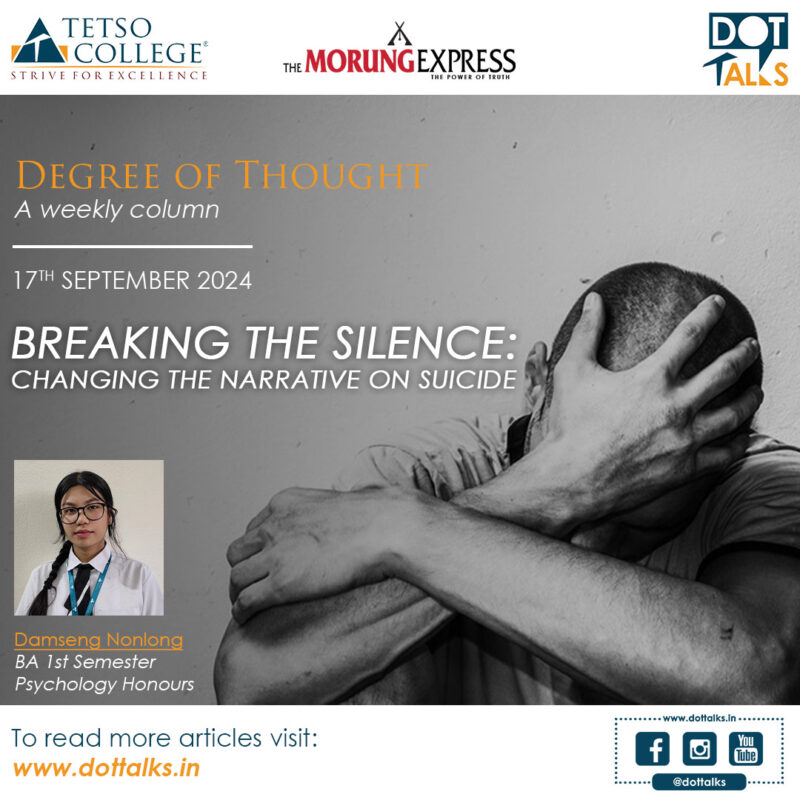Breaking The Silence: Changing The Narrative On Suicide
Suicide is a topic often shrouded in silence and stigma, leaving those affected feeling isolated and ashamed. However, it’s time to break this silence and change the narrative. By shifting the conversation from fear and judgement to support and hope, we can create a safer and more compassionate environment for those struggling.
There is an increase in suicide cases every year. 1.71 lakh suicides were recorded in 2022, registering a 4.2 % increase over 2021 and a jump of 27% compared to 2018. The rate of suicide per one lakh population has increased to 12.4 in 2022 which is the highest year for this data. Suicides during 2022 increased by 27% comparison to 2018 with India reporting highest number of suicides in the world. India’s contribution to global suicide deaths increased from 25.3% among men. In 2016, suicide was the most common cause of death in both the age groups of 15-29 years and 15-39 years. Daily wage earners accounted for 26% of suicide victims, the largest group in the suicide cases is increasing year by year because of the lack of awareness and sensitivity about mental health. There is a big stigma around people suffering from any kind of mental health issues. They are often tagged as “crazy”, “possessed” and many more by society. This leads to a vicious cycle of shame, suffering and isolation. People consider mental issues as taboo and they try to hide them. When people suffer from any mental health issues like severe depression, anxiety etc. they tend to isolate themselves, discouraging open discussion, creating a culture of secrecy.
Part of the reason mental health is often ignored is because there is still a lot of stigma surrounding mental illness. For many people, in our society, mental illness is seen as a sign of weakness. Family problems are a leading cause of suicides in India, accounting for about 32% of the 1,64,033 reported suicides in 2021. This is a 7.2% increase from 2020, indicating a growing concern. Family problems are a leading cause of suicides because of emotional distress. Conflicts, abuse, neglect, or rejection within the family can cause intense emotional pain. Lack of support is also another reason for the cause of suicides, unavailable or unsupportive family members can exacerbate feelings of isolation. Parental pressure over the children like overly high expectations, criticism, or comparison can burden individuals, this is also one of the many reasons many young adults commit suicide because they don’t want to disappoint their parents. Feeling trapped or without escape from family conflicts can lead to despair, helplessness, it is another reason that adds to the family problems, leading to suicide cases in India. The Centers for Disease Control and Prevention (CDC) reports that suicide rates among young adults (18-25) increased by 35.6 % from 2009 to 2018. Young adults who use social media are three times likely to suffer from depression, suicidal thoughts and behaviors because it has been reported that 36.5% of young adults experienced cyberbullying (Pew Research Centre, 2020). When people who are suffering from mental health issues try to be vocal about it, their family and their society shuts them down by shaming them, discouraging help-seeking and perpetuates shame.
Additionally, we need to change how we think and talk about suicide as a country, because that reflects our systems and our society. To strengthen India’s national policy for suicide prevention, it should be made mandatory for schools, colleges and educational institutions to teach about mental health and make them aware. It should be made as a seamless part of educational experience. Improvement of healthcare infrastructure is also very necessary. To increase mental professionals workforce, upgrade mental health facilities for mental health services and telepsychiatry services expansion . We should also
start treating those people suffering from mental health issues with compassion and dignity. Discussion about mental health should be normalised and offer resources and support. We need to start practising self-care and stress management and also learn coping skills and resilience.
In conclusion, to effectively address the issue of suicide, we must shift the conversation away from stigma and towards support. By doing so, we can reduce shame and isolation, increase awareness and education, encourage help-seeking behaviours, and promote hope and recovery. In addition to these efforts, it is crucial to address systemic issues that contribute to mental health problems, such as inadequate mental health infrastructure, social safety nets, and economic inequality. Promoting self-care and resilience through mindfulness, healthy relationships, and stress management techniques is also essential. Challenging stereotypes and stigma by fostering positive media portrayals, promoting mental health education, and encouraging open conversations can further contribute to a more supportive environment.
Empowering individuals by equipping them with coping skills, celebrating recovery stories, and emphasising the possibility of a brighter future is vital. Finally, enhancing professional support through specialized training, crisis hotlines, and follow-up care can ensure that those struggling with suicidal thoughts have access to the help they need. By addressing these multifaceted aspects of suicide prevention, we can create a more compassionate and supportive culture that prioritizes mental health and well-being.
Degree of Thought is a weekly community column initiated by Tetso College in partnership with The Morung Express. Degree of Thought will delve into the social, cultural, political and educational issues around us. The views expressed here do not reflect the opinion of the institution. Tetso College is a NAAC Accredited UGC recognised Commerce and Arts College. The editorial team includes Chubamenla, Asst. Professor, Dept. of English and Rinsit Sareo, Asst. Manager, IT, Media & Communications.
For feedback or comments please email: dot@tetsocollege.org


